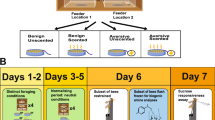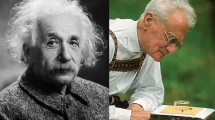Abstract
Honey bees, Apis mellifera, exploit the geomagnetic field for orientation during foraging and for alignment of their combs within hives. We tested the hypothesis that honey bees sense the polarity of magnetic fields. We created an engineered magnetic anomaly in which the magnetic field generally either converged toward a sugar reward in a watch glass, or away from it. After bees in behavioral field studies had learned to associate this anomaly with a sugar water reward, we subjected them to two experiments performed in random order. In both experiments, we presented bees with two identical sugar water rewards, one of which was randomly marked by a magnetic field anomaly. During the control experiment, the polarity of the magnetic field anomaly was maintained the same as it was during the training session. During the treatment experiment, it was reversed. We predicted that bees would not respond to the altered anomaly if they were sensitive to the polarity of the magnetic field. Our findings that bees continued to respond to the magnetic anomaly when its polarity was in its unaltered state, but did not respond to it when its polarity was reversed, support the hypothesis that honey bees possess a polarity-sensitive magnetoreceptor.



Similar content being viewed by others
References
Arendse MC (1978) Magnetic field detection is distinct from light detection in the invertebrates Tenebrio and Talitrus. Nature 274:358–362. doi:10.1038/274358a0
Arendse MC, Vrins JCM (1975) Magnetic orientation and its relation to photic orientation in T. molitor. Neth J Zool 25:407–437
Crosser MS, Scott S, Clark A, Wilt PM (2010) On the magnetic field near the center of Helmholtz coils. Rev Sci Instrum 81:084701
Davila AF, Fleissner G, Winklhofer M, Petersen N (2003) A new model for a magnetoreceptor in homing pigeons based on interacting clusters of superparamagnetic magnetite. Phys Chem Earth 28:647–652. doi:10.1016/S1474-7065(03)00118-9
De Jong D (1982) Orientation of comb building by honeybees. J Comp Physiol A 147:495–501
Desoil M, Gillis P, Gossuin Y, Pankhurst QA, Hautot D (2005) Definitive identification of magnetite nanoparticles in the abdomen of honeybees Apis mellifera. J Phys Conf Ser 17:45–49. doi:10.1088/1742-6596/17/1/007
Firester AH (1966) Design of square Helmholtz coil systems. Rev Sci Instrum 37:1264
Frier H, Edwards E, Smith C, Neale S, Collett TS (1996) Magnetic compass cues and visual pattern learning in honeybees. J Exp Biol 199:1353–1361
Fuxjager MJ, Eastwood BS, Lohmann KJ (2011) Orientation of hatchling loggerhead sea turtles to regional magnetic fields along a transoceanic migratory pathway. J Exp Biol 214:2504–2508. doi:10.1242/jeb.055921
Gould JL, Kirschvink JL, Deffeyes KS (1978) Bees have magnetic remanence. Science 201:1026–1028. doi:10.1126/science.201.4360.1026
Griffiths DJ (2013) Introduction to electrodynamics, 4th edn. Prentice-Hall, Upper Saddle
Hsu CY, Chan YP (2011) Identification and localization of proteins associated with biomineralization in the iron deposition vesicles of honeybees (Apis mellifera). PLoS One. doi:10.1371/journal.pone.0019088
Hsu CY, Li CW (1993) The ultrastructure and formation of iron granules in the honeybee (Apis mellifera). J Exp Biol 180:1–13
Hsu CY, Li CW (1994) Magnetoreception in honeybees. Science 265:95–97. doi:10.1126/science.265.5168.95
Johnsen S, Lohmann KJ (2005) The physics and neurobiology of magnetoreception. Nat Rev Neurosci 6:703–712. doi:10.1038/nrn1745
Johnsen S, Lohmann KJ (2008) Magnetoreception in animals. Phys Today 61:29–35. doi:10.1063/1.2897947
Kirschvink JL, Kobayashi-Kirschvink A (1991) Is geomagnetic sensitivity real? Replication of the Walker-Bitterman magnetic conditioning experiment in honey bees. Integr Comp Biol 31:169–186. doi:10.1093/icb/31.1.169
Lambinet V, Hayden ME, Reigel K, Gomis S, Gries G (2017) Linking magnetite in the abdomen of honey bees to a magnetoreceptive function. Proc R Soc B 284:20162873. doi:10.1098/rspb.2016.2873
Liang C-H, Chuang C-L, Jiang J-A, Yang E-C (2016) Magnetic sensing through the abdomen of the honey bee. Sci Rep 6:1–7. doi:10.1038/srep23657
Lohmann KJ (1991) Magnetic orientation by hatchling loggerhead sea turtles (Caretta caretta). J Exp Biol 155:37–49
Lohmann KJ, Lohmann CMF (1994) Detection of magnetic inclination angle by sea turtles: a possible mechanism for determining latitude. J Exp Biol 194:23–32
Lohmann KJ, Lohmann CMF (1996) Detection of magnetic field intensity by sea turtles. Nature 380:59–61. doi:10.1038/380059a0
Lohmann KJ, Willows AOD (1987) Lunar-modulated geomagnetic orientation by a marine mollusk. Sci AAAs 235:331–334
Lohmann K, Pentcheff N, Nevitt G, Stetten G, Zimmer-Faust R, Jarrard H, Boles L (1995) Magnetic orientation of spiny lobsters in the ocean: experiments with undersea coil systems. J Exp Biol 198:2041–2048
Lohmann KJ, Putman NF, Lohmann CMF (2008) Geomagnetic imprinting: a unifying hypothesis of long-distance natal homing in salmon and sea turtles. PNAS 105:19096–19101
Lohmann KJ, Putman NF, Lohmann CMF (2012) The magnetic map of hatchling loggerhead sea turtles. Curr Opin Neurobiol 22:336–342. doi:10.1016/j.conb.2011.11.005
Mann S, Sparks NH, Walker MM, Kirschvink JL (1988) Ultrastructure, morphology and organization of biogenic magnetite from sockeye salmon, Oncorhynchus nerka: implications for magnetoreception. J Exp Biol 140:35–49
Marhold S, Wiltschko W, Burda H (1997) A magnetic polarity compass for direction finding in a subterranean mammal. Naturwissenschaften 84:421–423. doi:10.1007/s001140050422
Phillips JB (1977) Use of the earth’s magnetic field by orienting cave salamanders (Eurycea lucifuga). J Comp Physiol A 121:273–288. doi:10.1007/BF00609616
Phillips JB, Freake MJ, Fischer JH, Borland SC (2002) Behavioral titration of a magnetic map coordinate. J Comp Physiol A 188:157–160. doi:10.1007/s00359-002-0286-x
Putman NF, Lohmann KJ, Putman EM, Quinn TP, Klimley AP, Noakes DLG (2013) Evidence for geomagnetic imprinting as a homing mechanism in pacific salmon. Curr Biol 23:312–316. doi:10.1016/j.cub.2012.12.041
Quinn TP (1980) Evidence for celestial and magnetic compass orientation in lake migrating sockeye salmon fry. J Comp Physiol A 137:243–248. doi:10.1007/BF00657119
Ritz T, Adem S, Schulten K (2000) A model for photoreceptor-based magnetoreception in birds. Biophys J 78:707–718. doi:10.1016/S0006-3495(00)76629-X
Thalau P, Holtkamp-Rötzler E, Fleissner G, Wiltschko W (2007) Homing pigeons (Columba livia f. domestica) can use magnetic cues for locating food. Naturwissenschaften 94:813–819. doi:10.1007/s00114-007-0259-6
Vácha M, Soukopova H (2004) Magnetic orientation in the mealworm beetle Tenebrio and the effect of light. J Exp Biol 207:1241–1248. doi:10.1242/jeb.00874
Vácha M, Drštková D, Půžová T (2008) Tenebrio beetles use magnetic inclination compass. Naturwissenschaften 95:761–765. doi:10.1007/s00114-008-0377-9
Válková T, Vácha M (2012) How do honeybees use their magnetic compass? Can they see the North? Bull Entomol Res 102:461–467. doi:10.1017/S0007485311000824
Wajnberg E, Acosta-Avalos D, Alves OC, de Oliveira JF, Srygley RB, Esquivel DMS (2010) Magnetoreception in eusocial insects: an update. J R Soc Interface 7:S207–S225. doi:10.1098/rsif.2009.0526.focus
Walker MM, Bitterman ME (1985) Conditioned responding to magnetic fields by honeybees. J Comp Physiol 157:67–71. doi:10.1007/Bf00611096
Walker M, Bitterman M (1989a) Honeybees can be trained to respond to very small changes in geomagnetic field intensity. J Exp Biol 145:489–494
Walker M, Bitterman M (1989b) Attached magnets impair magnetic field discrimination by honeybees. J Exp Biol 141:447–451
Wang Y, Pan Y, Parsons S, Walker M, Zhang S (2007) Bats respond to polarity of a magnetic field. Proc R Soc B 274(1627):2901–2905. doi:10.1098/rspb.2007.0904
Wiltschko W (1980) The earth’s magnetic field and bird orientation. TINS 3:140–144
Wiltschko W, Wiltschko R (1972) Magnetic compass of European robins. Sci New Ser 176:62–64
Wiltschko W, Wiltschko R (2002) Magnetic compass orientation in birds and its physiological basis. Naturwissenschaften 89:445–452. doi:10.1007/s00114-002-0356-5
Wiltschko R, Wiltschko W (2003) Avian navigation: from historical to modern concepts. Anim Behav 65:257–272. doi:10.1006/anbe.2003.2054
Wiltschko W, Wiltschko R (2005) Magnetic orientation and magnetoreception in birds and other animals. J Comp Physiol A 191:675–693. doi:10.1007/s00359-005-0627-7
Wiltschko R, Wiltschko W (2006) Magnetoreception. BioEssays 28:157–168. doi:10.1002/bies.20363
Winklhofer M, Kirschvink JL (2010) A quantitative assessment of torque-transducer models for magnetoreception. J R Soc Interface 7:S273–S289. doi:10.1098/rsif.2009.0435.focus
Yoshii T, Ahmad M, Helfrich-Förster C (2009) Cryptochrome mediates light-dependent magnetosensitivity of Drosophila’s circadian clock. PLoS Biol 7:e1000086. doi:10.1371/journal.pbio.1000086
Acknowledgements
We thank Brian Andrade for assistance in the construction of the two-choice table; the owners of the Spray Creek ranch and the Texas Creek ranch for permitting experimentation on their land; Hannah Crisp for assisting in data collection; Tristan Banwell for various hands-on work and help; Stephen DeMuth and Stephen Takács for graphical illustrations; Gitta Lambinet and Fritz Lambinet for supporting VL’s education and providing financial assistance; and two anonymous reviewers for constructive comments. The research was supported by Graduate Fellowships from Simon Fraser University to VL, NSERC Discovery Grants to MEH and GG, and by an NSERC—Industrial Research Chair to GG, with Scotts Canada Ltd. as the industrial sponsor.
Author information
Authors and Affiliations
Corresponding authors
Ethics declarations
Conflict of interest
The authors declare that they have no conflict of interest.
Rights and permissions
About this article
Cite this article
Lambinet, V., Hayden, M.E., Reid, C. et al. Honey bees possess a polarity-sensitive magnetoreceptor. J Comp Physiol A 203, 1029–1036 (2017). https://doi.org/10.1007/s00359-017-1214-4
Received:
Revised:
Accepted:
Published:
Issue Date:
DOI: https://doi.org/10.1007/s00359-017-1214-4




